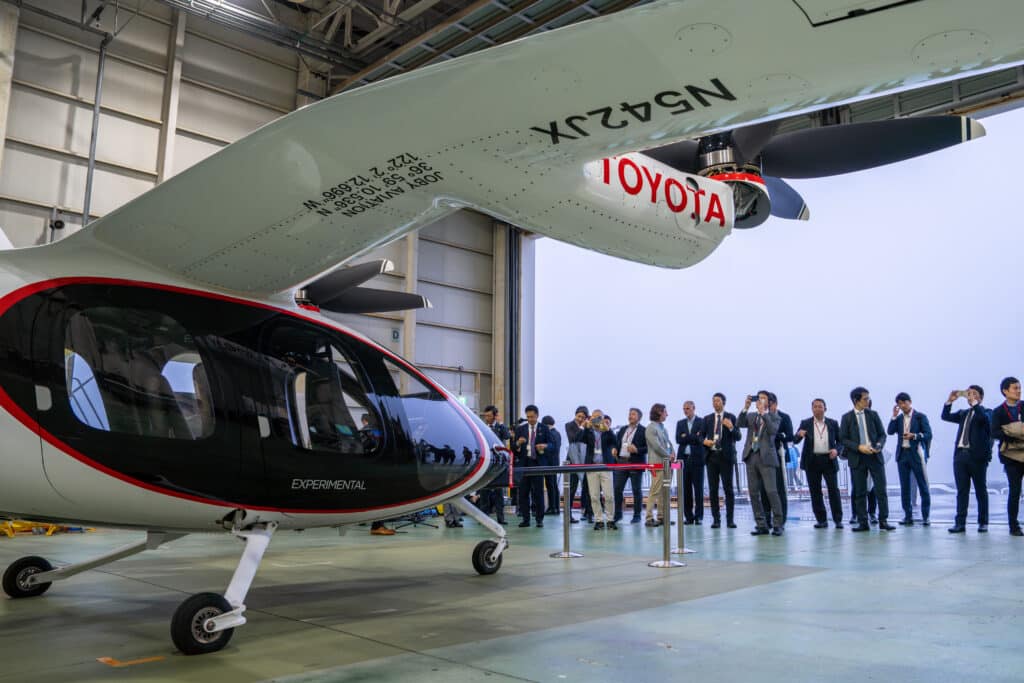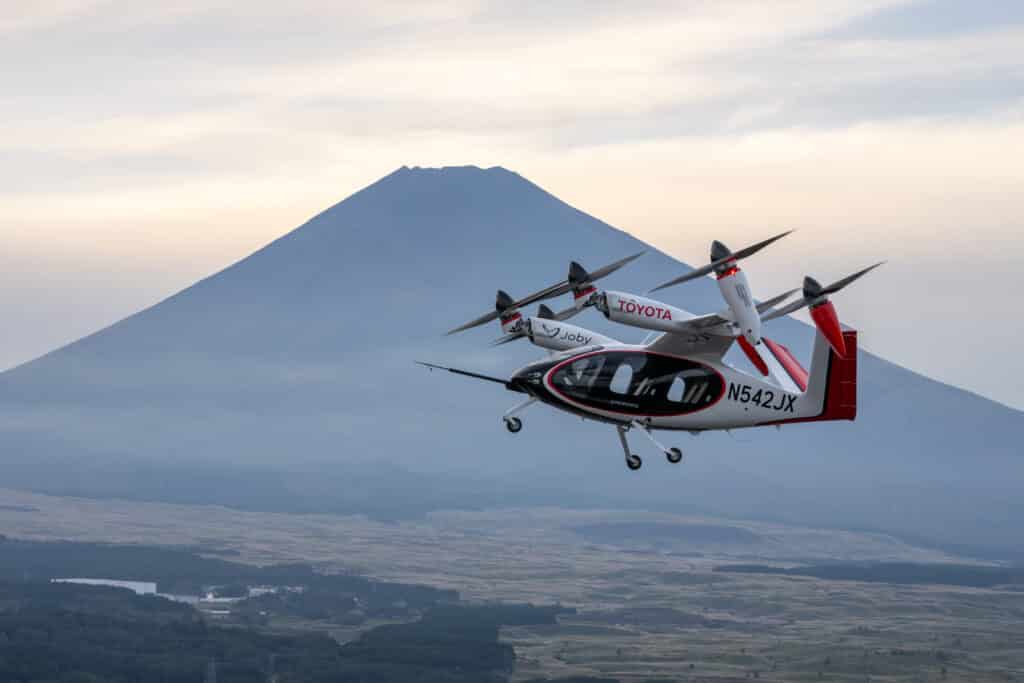Toyota and Joby Complete First Electric Air Taxi Flight in Japan
Toyota Motor Corporation and Joby Aviation, Inc. reached a significant milestone in their partnership with the completion of Joby’s first international exhibition flight this week. This event took place at Toyota’s Higashi-Fuji Technical Center in Shizuoka, Japan, marking an important step towards the commercialization of electric air taxis.
The recent exhibition flight completed by Joby Aviation in collaboration with Toyota marks a significant achievement for both companies, highlighting nearly seven years of partnership. This flight, conducted near Mount Fuji, provided an opportunity to demonstrate the low acoustic footprint of Joby’s emissions-free aircraft, which is crucial for addressing community concerns about noise pollution as urban air mobility becomes more prevalent.
Throughout their collaboration, Toyota has shared valuable insights from its extensive automotive manufacturing and technology expertise, helping to refine Joby’s aircraft design and production processes. Notably, Toyota engineers now work alongside Joby’s team in California, fostering a collaborative environment that facilitates real-time problem-solving and innovation. This hands-on support is essential for advancing the development of air mobility solutions.
In 2023, the companies further solidified their partnership by signing a long-term agreement for Toyota to supply key powertrain and actuation components for Joby’s aircraft. This arrangement enhances Joby’s production capabilities and ensures a reliable supply of critical technologies needed for its innovative aircraft.

At the event, Hiroki Nakajima, executive vice president and chief technology officer of Toyota Motor Corporation, said: “Air mobility has the potential to change our ‘sense of distance and time,’ and open a future with the new option of air mobility that will further enrich the lives of many people.”
“Toyota is committed to deepening our collaboration with Joby and we will continue to work together to realize our shared dreams,” he continued.
Together, Toyota and Joby are strategically positioned in the growing sector of urban air mobility, aiming to create an integrated transportation ecosystem that combines ground and air solutions. This collaboration not only focuses on developing air taxis but also seeks to enhance urban transportation efficiency and sustainability.
“Our first overseas flight marks a significant milestone on our journey towards making clean air travel an everyday reality,” said JoeBen Bevirt, Founder and CEO of Joby. “We share Toyota’s vision for the future of mobility and are honored to have had the opportunity to present a glimpse of that future through our flight in Japan.”

Key Highlights of the Announcement
First International Flight: This flight showcases Joby Aviation’s electric air taxi technology outside of the United States, highlighting the potential for international applications of their aircraft.
Collaboration with Toyota: Toyota’s involvement emphasizes its commitment to innovative mobility solutions. As a major automotive manufacturer, Toyota brings expertise in engineering and manufacturing that can complement Joby’s advancements in electric aviation.
Electric Air Taxi Development: Joby Aviation is focused on creating all-electric air taxis that are designed to provide efficient, quiet, and environmentally friendly transportation. Their aircraft aims to transform urban mobility and reduce congestion by providing on-demand air travel.
Vision for Future Mobility: The partnership between Toyota and Joby aligns with both companies’ visions for the future of transportation, which includes sustainable, integrated mobility solutions that leverage cutting-edge technology.
Potential for Commercial Service: This successful flight marks a step closer to Joby’s goal of launching commercial air taxi services. The collaboration may pave the way for a broader deployment of air taxi services in urban environments.
Next Steps: Following this successful exhibition flight, both companies are likely to continue developing their technologies and operational frameworks to ensure a safe and effective entry into the commercial market.
Joby’s electric air taxi is designed to transport a pilot and four passengers at speeds of up to 200 mph, providing high-speed mobility with zero operating emissions and significantly less noise compared to helicopters. This innovative mobility service aims to alleviate traffic congestion, reduce environmental impact, and offer transportation solutions for both urban and rural areas, showcasing its potential to tackle various transportation challenges in Japan and globally. Since its founding in 2009, Joby has completed thousands of test flights, including notable exhibition flights from the iconic Downtown Manhattan Heliport in New York City.
In recent news, Toyota has announced its commitment to invest an additional $500 million in Joby, which will support the certification and commercial production of the electric air taxi. With this latest investment, Toyota’s total financial backing for Joby will reach $894 million. The investment plan includes establishing a manufacturing alliance to facilitate the initial phase of commercialization. The funding will be released in two equal tranches, contingent upon standard regulatory approvals and specific conditions, including the finalization of collaborative and commercial agreements. Additionally, the second tranche will depend on the conclusion of terms related to a strategic alliance focused on commercial manufacturing and other prerequisites.
The completion of Joby Aviation’s first international exhibition flight in collaboration with Toyota is a significant development in the push for advanced air mobility solutions. It underscores the potential of electric air taxis to revolutionize urban transportation and reflects the growing trend of integrating air travel into everyday mobility options. As both companies continue to innovate and refine their technologies, they could play a pivotal role in shaping the future landscape of transportation.
